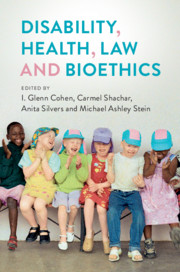Book contents
- Disability, Health, Law, and Bioethics
- Disability, Health, Law, and Bioethics
- Copyright page
- Dedication
- Contents
- Notes on Contributors
- Introduction
- Preface
- Acknowledgments
- Part I Disability: Definitions and Theories
- Part II Disability in the Beginning and the End of Life
- Part III Disability in the Clinical Setting
- Introduction to Part III
- 7 Expressing Respect for People with Disabilities in Medical Practice
- 8 Disabled Bodies and Good Organs
- 9 Humanizing Clinical Care for Patients with Disabilities
- 10 Chronic Pain As a Challenge for Disability Theory and Policy
- Part IV Equality, Expertise, and Access
- Part V Disability, Intersectionality, and Social Movements
- Part VI Quantifying Disability
7 - Expressing Respect for People with Disabilities in Medical Practice
from Part III - Disability in the Clinical Setting
Published online by Cambridge University Press: 08 April 2020
- Disability, Health, Law, and Bioethics
- Disability, Health, Law, and Bioethics
- Copyright page
- Dedication
- Contents
- Notes on Contributors
- Introduction
- Preface
- Acknowledgments
- Part I Disability: Definitions and Theories
- Part II Disability in the Beginning and the End of Life
- Part III Disability in the Clinical Setting
- Introduction to Part III
- 7 Expressing Respect for People with Disabilities in Medical Practice
- 8 Disabled Bodies and Good Organs
- 9 Humanizing Clinical Care for Patients with Disabilities
- 10 Chronic Pain As a Challenge for Disability Theory and Policy
- Part IV Equality, Expertise, and Access
- Part V Disability, Intersectionality, and Social Movements
- Part VI Quantifying Disability
Summary
All too often, the medical community treats people with disabilities in insulting and demeaning ways. Medical staff express disrespectful attitudes about disabled people through the environments they create, the policies they maintain, and the manner in which they interact with disabled patients. The symbolic messages of an inaccessible waiting room, a practice of transporting partially clothed disabled patients through public areas, or a turned-up lip at requests for accommodations are often offensive to disabled people. We – people with disabilities – deserve to be treated justly and humanely in medical settings, but we also deserve to be respected and to be shown respect in those contexts as well.
- Type
- Chapter
- Information
- Disability, Health, Law, and Bioethics , pp. 93 - 103Publisher: Cambridge University PressPrint publication year: 2020
- 1
- Cited by

